Did Universal Studios Sue Nintendo Over Donkey Kong Infringing on Their King Kong Trademark?
Here is the latest in a series of examinations into urban legends about movies and whether they are true or false. Click here to view an archive of the movie urban legends featured so far.
MOVIE/VIDEO GAME URBAN LEGEND: Universal Studios sued Nintendo over Donkey Kong infringing on their King Kong trademark.
One of the most interesting aspects of trademark law is that cases involving trademark infringement rarely actually make it to trial. This is because it is almost always more cost-effective for a person or a company to simply change the trademark that they are using when they receive a cease and desist letter from a large company asserting trademark infringement rather than spending the money to go to trial to defend their use of the mark. If you follow that train of thought to its logical conclusion, then, you will realize then that it is possible for large companies to successfully argue trademark infringement even if they don’t have a legal leg to stand on, simply because they have enough money to threaten smaller entities into backing down. They are essentially the 300-pound gorilla in the room and everyone has to get out of their way. When one of those small companies does choose to fight back, though, the results can be surprising. An excellent example of this is when Universal City Studios (“Universal”) decided to sue Nintendo over Donkey Kong infringing upon Universal’s King Kong trademark.
The arcade game Donkey Kong debuted in from Nintendo in 1981 and soon became one of the most successful video games of all-time. The concept behind the game is that Donkey Kong is the pet of a man named Jumpman (later re-named Mario in the United States) and is abused by Jumpman to the point where Donkey Kong kidnaps Jumpman’s girlfriend, Lady (later re-named Pauline) and Jumpman has to rescue her from Donkey Kong by traveling up a series of ladders while Donkey Kong throws barrels at him to stop him (there are a series of escalating challenges the further you go in the game). Donkey Kong was one of the first video games (if not the first) to use a storyline and established characters to make the game more exciting. You’re not just blasting away at inanimate objects, you’re specifically trying to rescue a damsel in distress! Donkey Kong soon became the template many video games would try to copy over the years (and Donkey Kong and Mario both became two of the most famous video game characters ever).
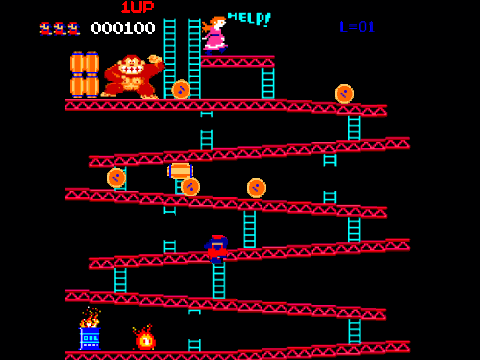
However, there were some who felt that the template of the game seemed mighty familiar. The idea of a giant ape kidnapping a woman and taking her to the top of a building sure sounds like the famous film, King Kong, doesn’t it?
Well, in 1982, with the game a complete pop culture sensation, Universal president Sid Sheinberg finally heard about the game and he had one of his subordinates investigate the game. He was then told that it sure seemed like the game was infringing on their rights to King Kong. So Sheinberg contacted Coleco president Arnold Greenberg. Coleco was licensing Donkey Kong in the United States from Nintendo for home video game consoles. Sheinberg threatened Greenberg with trademark infringement and ultimately got Greenberg to agree to give Universal a 3% cut of all sales of Donkey Kong video games, which was worth roughly $4 million.
An issue arose, though, when Tiger, a handheld video game manufacturer, licensed King Kong from Universal for a handheld game. Universal quickly realized that the arrangement that they had signed with Tiger would prohibit them from licensing King Kong to another video game company, and that’s basically what they just did by taking the deal from Coleco, so the Tiger game could possibly void the deal that they just signed with Coleco. In addition, the Tiger handheld game looked a bit too much like Donkey Kong for their comfort. So Universal tried to get out of their deal with Tiger. They were unable to, but they were at least able to get Tiger to ease off on the rights exclusivity, so the Coleco deal could stand. They also got Tiger to alter their game so it was not too similar to Donkey Kong.
While Coleco caved in quickly, when Universal made the same threat to Nintendo, the Japanese video game company decided that Universal’s claims of ownership regarding King Kong were not based on solid ground so they refused to settle. Universal then officially sued Nintendo over trademark infringement. Universal also sent cease-and-desist letters to all the various companies who had begun to license Donkey Kong for other products (like Donkey Kong cereal, Donkey Kong board games, stuff like that). As it turned out, Universal had overplayed their hand. Why? Well, as it turned out, Universal didn’t actually own the King Kong name!
King Kong was created by Merian C. Cooper, a filmmaker, who came up with the concept for the 1933 film, which was made by RKO. RKO also made a sequel, Son of Kong, later in 1933. Cooper believed that he owned the rights to the character and had just licensed the character to RKO, but as he learned many years later, he had actually lost the rights to the original King Kong films to RKO. Cooper did own the rights to the novelization of King Kong, though.
The battle over the rights of King Kong came to a head in the mid-1970s when famed movie producer Dino De Laurentiis and Universal were fighting over who had the right to do a King Kong re-make. De Laurentiis went to buy the rights to Kong from RKO. Universal, though, argued that since Cooper owned the rights to the novelization of King Kong and had then failed to renew the copyright on that novelization years later, then that novelization was in the public domain and that Universal should be allowed to do a film based just on that novelization. So they sued RKO. This would become an important point years later in the Nintendo lawsuit.
Ultimately, the ruling was that RKO had the rights and associated trademarks to the first two King Kong films, the novelization was in the public domain (but only the parts of the novelization that were not also in the RKO films, which basically is meaningless) and the rights to the actual character King Kong belonged to Merian Cooper’s estate. The Cooper estate then sold their rights to Universal (except the publishing rights – so they’ve licensed King Kong for a few comic books over the years). Universal and De Laurentiis then worked out a deal where Universal would get a cut of the De Laurentiis re-make (the one starring Jeff Bridges, Charles Grodin and Jessica Lange) in exchange for Universal delaying their King Kong picture for 18 months (they ended up not actually making their King Kong version until 2005, when Peter Jackson directed an Academy Award-winning remake).
In addition, RKO agreed to never sue Universal if Universal made a King Kong film (Universal would then give RKO a very small cut of the film’s profits).
When Universal and Nintendo went to court, the judge in the case, Robert W. Sweet, basically tore Universal apart over the events of their previous lawsuit against RKO. Essentially, his position was that Universal had to know that they did not actually own any trademark to King Kong as he appeared in the original RKO films because that was the result of the past lawsuit. They only owned the copyright to the actual character King Kong. The rights they gained from the Cooper purchase did not include a trademark on the name or visual appearance of King Kong. So not only did they not have a legal leg to stand on, but they had to know that they did not before they sued Nintendo, so they were guilty of abusing the legal process.
Sweet also ruled that even had Universal owned the trademark on King Kong he would have ruled against them, as Donkey Kong was not similar enough to King Kong to cause any confusion. At worst, he would be a parody of King Kong and would be protected by parody rights. Finally, Sweet also ruled that the Tiger King Kong game was too similar to Donkey Kong. So Nintendo not only won the case, but they won Universal’s licensing fees from the Tiger King Kong game as well as all legal fees in the case (over a million dollars). Plus, all of Nintendo’s licenses were able to seek damages against Universal (Universal paid off Coleco by buying stock in the company).
It was a total victory for Nintendo and really helped demonstrate to everyone watching that Nintendo was here to stay. Nintendo gave the lawyer who represented them at trial, John Kirby, a yacht called Donkey Kong. There is also a decent chance that the Nintendo video game character Kirby was named in honor of John Kirby.
The legend is…
STATUS: True
Feel free (heck, I implore you!) to write in with your suggestions for future installments! My e-mail address is bcronin@legendsrevealed.com.
Tags: Horror films


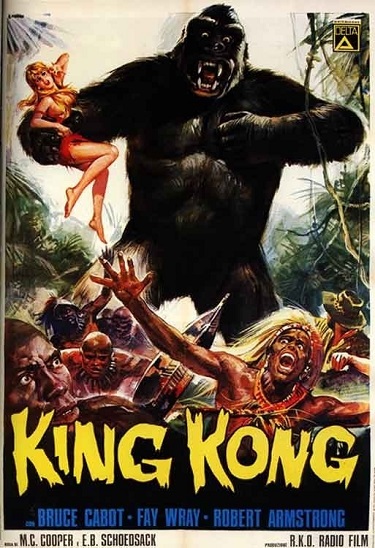
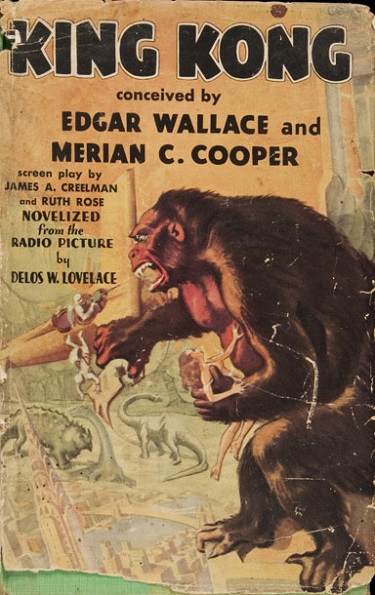
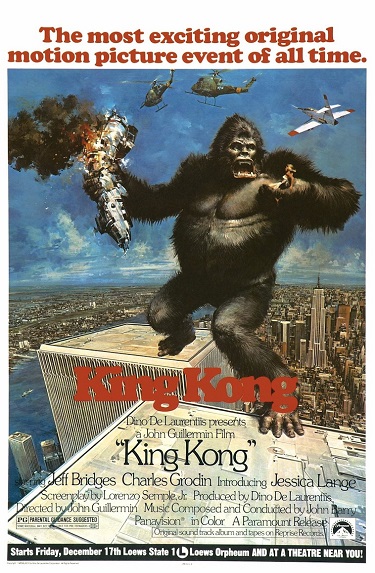
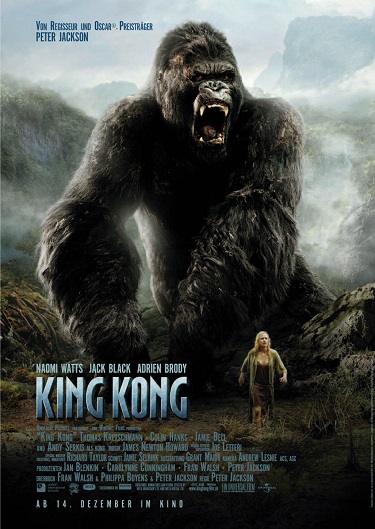




[…] try to, in effect, bully smaller companies into backing down with IP rights (a famous example was Universal trying to force Nintendo to change the name of Donkey Kong despite Universal knowing that …), but it is still a bit of a shame when it happens like this. The Rocketeers? […]
I was watching the original King Kong movie on the television last week and thought about the idea that Donkey Kong might be problem for whomever owned the fictional beast. I also have to say that the original Kong makes Jackson’s Kong look terrible. It’s not to long and it’s tense, despite it’s primitive effects, some of which are very effective.
Wait a minute… The Cooper estate (and then Universal) had the rights to the _character_, but not to his name nor his physical appearance? But what is a character without both things?
They had the copyright to the character, but not a trademark. Trademark is what you would use to keep people from using the likeness of your character or the name. No one else can do a new King Kong story without their permission, but they had no control over the name or the likeness.